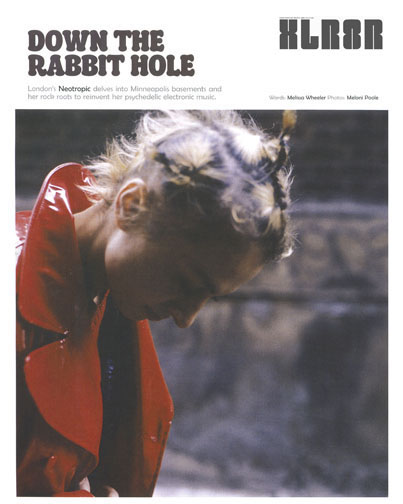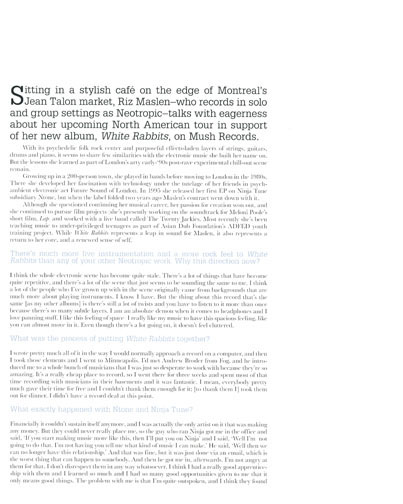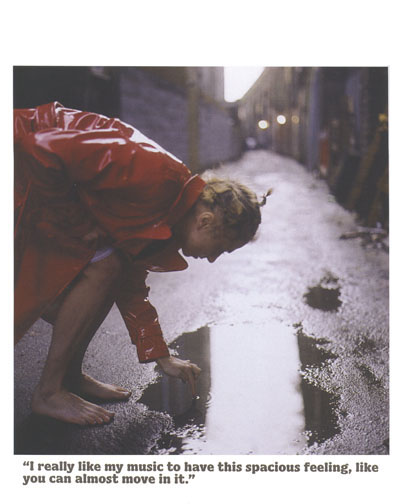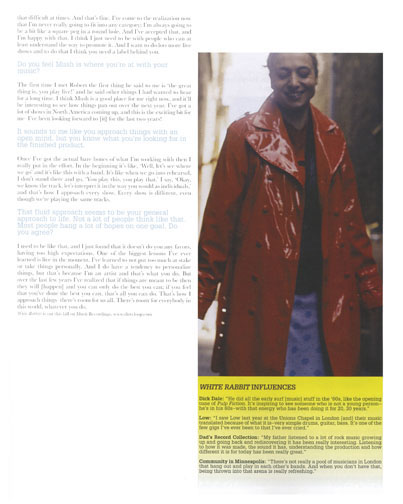
DOWN THE RABBIT HOLE
LONDON'S NEOTROPIC DELVES INTO MINNEAPOLIS BASEMENTS AND HER ROCK ROOTS REINVENT HER PSYCHADELIC ELECTRONIC MUSIC
Sitting in a stylish café on the edge of Montreal's Jean talon market, Riz Maslen - who records in solo and group settings as Neotropic - talks with eagerness about her upcoming North American tour in support of her new album, 'White Rabbits', on Mush Records.
With its psychedelic folk rock center and purposeful effects-laden layers of strings, guitars, drums and piano, it seems to share few similarities with the electronic music she built her name on. But the lessons she learned as part of London's arty early - '90s post-rave experimental chill-out scene remain.
Growing up in a 200-person town, she played in bands before moving to London in the 1980s. There she developed her fascination with technology under the tutelage of her friends in psych-ambient electronic Future Sound of London. In 1995 she released her first EP on Ninja Tune subsidiary Ntone, but when the label folded two years ago Maslen's contract went down with it.
Although she questioned continuing her musical career, her passion for creation won out, and she continued to pursue film projects (she's presently working on the soundtrack for Meloni Poole's short film, 'Lap') and worked with a live band called The Twenty Jackies. Most recently she's been teaching music to under-privileged teenagers as part of Asian Dub Foundation's ADFED youth training project. While 'White Rabbits' represents a leap in sound for Maslen, it also represents a return to her core, and a renewed sense of self.
There's much more live instrumentation and a more rock feel to 'White Rabbits' than any of your other Neotropic work. Why this direction now?
I think the whole electronic scene has become quite stale. There's a lot of things that have become quite repetitive, and there's a lot of the scene that just seems to be sounding the same to me. I think a lot of the people who I've grown up with in the scene originally came from backgrounds that are much more about playing instruments. I know I have. But the thing about this record that's the same [as my other albums] is there's still a lot of twists and you have to listen to it more than once because there's so many subtle layers. I am an absolute demon when it comes to headphones and I love panning stuff. I like this feeling of space, I really like my music to have this spacious feeling, like you can almost move in it. Even though there's a lot going on, it doesn't feel cluttered.
What was the process of putting 'White Rabbits' together?
I wrote pretty much all of it in the way I would normally approach a record on a computer, and then I took those elements and I went to Minneapolis. I'd met Andrew Broder from Fog, and he introduced me to a whole bunch of musicians that I was just so desperate to work with because they're so amazing. It's a really cheap place to record, so I went there for three weeks and spent most of that time recording with musicians in their basements and it was fantastic. I mean, everybody pretty much gave their time for free and I couldn't thank them enough for it; [to thank them I] took them out for dinner. I didn't have a record deal at this point.
What exactly happened with Ntone and Ninja Tune?
Financially it couldn't sustain itself anymore, and I was actually the only artist on it that was making any money. But they couldn't really place me, so the guy who ran Ninja got me in the office and said, 'If you start making music more like this, then I'll put you on Ninja' and I said, 'Well I'm not going to do that. I'm not having you tell me what kind of music I can make.' He said, 'Well then we can no longer have this relationship.' And that was fine, but it was just done via an email, which is the worst thing that can happen to somebody. And then he got me in, afterwards. I'm not angry at them for that. I don't disrespect them in any way whatsoever. I think I had a really good apprenticeship with them and I learned so much and I had so many good opportunities given to me that it only means good things. The problem with me is that I'm quite outspoken, and I think they found that difficult at times. And that's fine. I've come to the realization now that I'm never going to fit into any category; I'm always going to be a bit like a square peg in a round hole. And I've accepted that, and I'm happy with that. I think I just need to be with people who can at least understand the way to promote it. And I want to do lots more live shows and to do that I think you need a label behind you.
Do you feel Mush is where you're at with your music?
The first time I met Robert the first thing he said to me is 'the great thing is, you play live!' and he said other things I had wanted to hear for a long time. I think Mush is a good place for me right now, and it'll be interesting to see how things pan out over the next year. I've got a lot of shows in North America coming up, and this is the exciting bit for me - I've been looking forward to [it] for the last two years!
It sounds to me like you approach things with an open mind, but you know what you're looking for in the finished product.
Once I've got the actual bare bones of what I'm working with then I really put in the effort. In the beginning it's like, 'Well, let's see where we go' and it's like this with a band. It's like when we go into rehearsal. I don't stand there and go, 'You play this, you play that.' I say, 'Okay, we know the track, let's interpret it in the way you would as individuals,' and that's how I approach every show. Every show is different, even though we're playing the same tracks.
That fluid approach seems to be your general approach to life. Not a lot of hopes on one goal. Do you agree?
I used to be like that, and I just found that it doesn't do you any favors, having too high expectations. One of the biggest lessons I've ever learned is live in the moment. I've learned to not put too much at stake or take things personally. And I do have a tendency to personalize things, but that's because I'm an artist and that's what you do. But over the last few years I've realized that if things are meant to be then they will [happen] and you can only do the best you can; if you feel that you've done the best you can, that's all you can do. That's how I approach things - there's room for us all. There's room for everybody in this world, whatever you do.



WHITE RABBITS INFLUENCES
Dick Dale: "He did all the early surf [music] stuff in the '60s, like the opening tune of 'Pulp Fiction'. It's inspiring to see someone who is not a young person - he's in his 60s - with that energy who has been doing it for 20, 30 years."
Low: "I saw Low last year at the Unions Chapel in London [and] their music translated because of what it is - very simple drums, guitar, bass. It's one of the few gigs I've ever been to that I've cried."
Dad's Record Collection: "My father listened to a lot of rock music growing up and going back and rediscovering it has been really interesting. Listening to how it was made, the sound it has, understanding the production and how different it is for today has been really great."
Community in Minneapolis: "There's not really a pool of musicians in London that hang out and play in each other's bands. And when you don't have that, being thrown into that arena is really refreshing."
MELISSA WHEELER